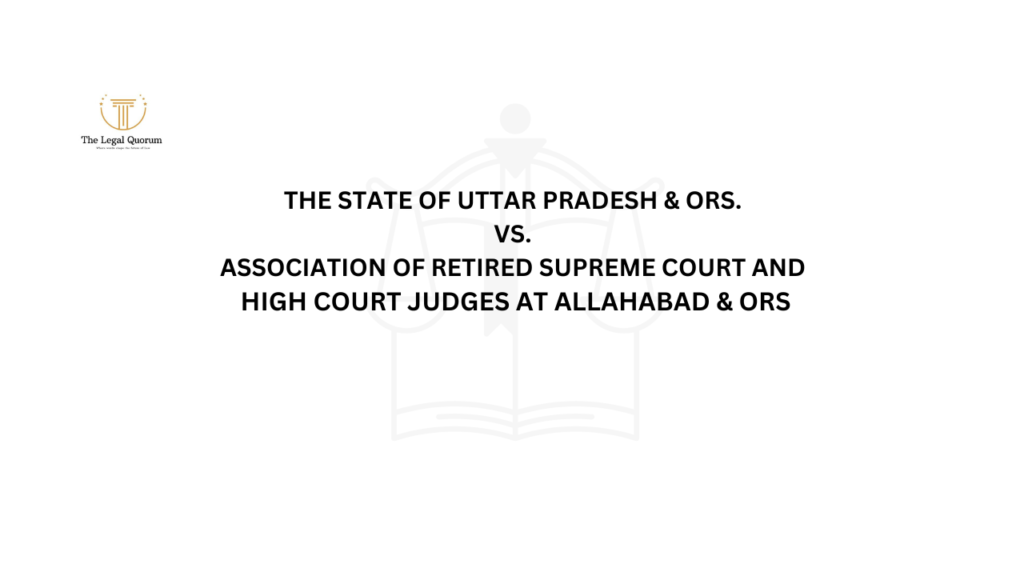Published On: 2nd September, 2024
Authored By: Imrah Fatima Farooqui
Jamia Millia Islamia
INTRODUCTION
In the recent major ruling in the case of Aureliano Fernandes v State of Goa and Others, the Supreme Court has identified numerous shortcomings and lapses in the implementation of the Sexual Harassment of Women at Workplace (Prevention, Prohibition, and Redressal) Act, 2013 (referred to as the “POSH Act”). The Supreme Court has issued a series of directives in this case, mandating that both the State and non-state entities, including educational institutions, private hospitals, and nursing homes, adhere to the POSH Act with strict diligence. This is to ensure the [1]protection of all working women and to guarantee that the main intentions underlying the enactment of the POSH Act are fully realized in both form and spirit.
FACTS
The appellant was a lecturer in the Department of Political Science at Goa University, who was alleged of sexual harassment against several female students of the university. The internal committee of the university after receiving multiple complaints about the harassment from the students decided to set up an inquiry against the appellant in March 2009. The internal committee after inquiring passed an order against the appellant in his absence. He was later dismissed by the university’s authority and barred from seeking future employment at the university. The matter took a turn when the appellant highlighted that the decision was arrived at “ex-parte” which means ‘in the absence of the party’, and submitted its report to the Registrar of the Goa University. Subsequently, the executive committee of the university suspended the appellant under Rule 14 of the Central Civil Services Rules, 1965 ( CCS CCA Rules ).[2]
The appellant therefore challenged the order of the internal committee alleging that the order was passed “ex-parte” as he was unable to attend the meetings because of some health issues. However, the Bombay High Court observed that the appellant was granted opportunities but he failed to appear. Another concern showed by the appellant was that the committee was improperly constituted and the decision was taken in a hurry which was turned down by the High Court of Bombay. The decision of the high court therefore aggrieved the appellant, he challenged it before the Supreme Court.
ISSUES
- Whether the inquiry’s decision was in violation of the CCS rules, 1965?
- Whether the “ex-parte” decision breach the principles of natural justice and cause prejudice against the appellant?
- Whether the appellant was deprived of a reasonable opportunity to defend himself?
JUDGEMENT
The Supreme Court held that the committee had not strictly followed the procedure as per the CCS Rules,1965 but it had followed the “as far as practicable” norm and had done its work improperly. The court held that the inquiry was done in a very hasty manner and did not provide a reasonable time for the appellant to respond to the allegations. Further, it stated that the appellant couldn’t appear in the proceedings of the committee due to some medical grounds which although seems suspicious as the fast-forwarded proceedings were done ex-parte, violated one of the principles of natural justice that is “Audi Alteram Partem which means [3]no one shall be left unheard”.[4]
The Supreme Court quashed the judgment passed by the Bombay High Court on the ground that there were many irregularities in the procedure of the committee which didn’t provide a fair judgement to the appellant. Therefore, the matter was again sent to the internal committee to conduct an inquiry again with properly following the procedure as prescribed under the CSS rules,1965, and in accordance with the principles of Natural Justice.
Directions by the Supreme Court –
Furthermore, the Supreme Court has instructed to enhance the enforcement of the POSH (Prevention of Sexual Harassment) Act[5], requiring the following actions:
(a) The Central Government, State Governments, and Union Territories are obligated to carry out a timely audit to ensure all the relevant government ministries, departments, organizations, agencies, public sector bodies, institutions, and entities have established Local Committees (LCs)/Internal Committees (ICs), as applicable, and that these committees adhere strictly to the POSH Act’s guidelines regarding their makeup.
(b) It is also necessary to ensure that all the essential information related to the formation and structure of LCs/ ICs, as well as specifics such as email addresses and phone numbers of the appointed representatives, the steps for filing an online complaint, and the pertinent rules, regulations, and internal policies, is accessible and visible on the official website of the relevant authority or entity as applicable. This information must also be periodically refreshed.
(c) swift and efficient actions required by the officials, leaders, or employers to acquaint LCs/ ICs with their responsibilities and the proper way to carry out an investigation when a complaint of sexual harassment is made at work, starting from the moment the complaint is acknowledged up to the point when the investigation is completed and the findings are turned in.
(d) The officials, leaders, or employers are obligated to regularly organize training sessions, workshops, seminars, and awareness campaigns to enhance the skills of LCs/ ICs and to inform women employees and women’s groups about the terms of the POSH Act, the regulations, and the specific rules.
ANALYSIS
The court approached the case with a fair perspective. It determined that the disciplinary committee failed to adhere to the guidelines outlined in rule 14 of the CCS (CJI) Regulations, noting several flaws in the process. This included the committee’s haste in moving the case forward, and the undue pressure placed on the appellant to respond quickly. Furthermore, the committee overlooked the appellant’s health concerns in their decision-making. As a result, the appellant was not given sufficient chances to defend himself adequately in court.
Rule 14(2) of the CCS Rules mandates that the committee should investigate a complaint of sexual harassment “as far as practicable,” adhering to the procedure outlined in these rules. The specified procedure encompasses issuing a charge sheet, providing details regarding the charges, compiling a statement of imputations for each charge, and submitting a list of witnesses and documents relied upon by the employer. In the particular case under review, the committee did not adhere to the exact procedure; however, it performed its duties as diligently as possible due to several reasons:
- all complaints and depositions were made public, thereby notifying the appellant of the allegations
- The appellant was asked to supply a list of witnesses
- The appellant was allowed to cross-examine the witnesses, including the complainants.
Neither the employer nor the committee had knowledge of the full extent of their inquiry, leading to the Enforcement Commission (EC) proceeding without confirming its legal position. As a result, due to the lack of strict adherence to the procedure established by Rule 14, the inquiry process was expedited, compromising the fairness and impartiality of the hearing.
The court when making decisions considered two principles of natural justice which are NEMO JUDEX IN CAUSA SUA AND AUDI ALTERAM PARTEM. The former talks about that “no one should be a judge in his own cause.” which was a major concern of the appellant as the members of the inquiry committee were his juniors. The latter means “no one should be left unheard” focuses on the reasonable opportunity that must be given to the appellant, but he was deprived of the same as the inquiry was wrapped up in a hasty manner ignoring the absence of the Appellant due to some medical grounds and taking an “ex-parte” decision.
The court’s decision was made following a violation of the principles of natural justice during the case proceedings, leading it to reverse the High Court’s previous decision and invalidate the Executive Commission’s report that resulted in the appellant’s dismissal from his job. Additionally, the court issued several instructions for the committee to ensure the protection of rights under the principles of natural justice.
CONCLUSION
In conclusion, the judgment in “Aureliano Fernandes v. State of Goa and Others” highlights the critical importance of adhering to principles of natural justice in disciplinary proceedings. The Supreme Court determined that the inquiry conducted by the complaints committee of Goa University strayed from the established procedural norms, especially during the rushed proceedings in May 2009. Aureliano Fernandes was not given sufficient time and opportunity to present his defense, and his health concerns were not properly considered.
The above instructions indicate that the Court has primarily focused on public institutions, universities, and government authorities, among others, without specifically mentioning private establishments. However, considering that the POSH Act applies equally to private establishments, it is expected that there will be increased scrutiny of these entities in the coming weeks and months. Given that sexual harassment is a significant issue, non-compliance with the POSH Act could also lead to reputational risks for companies. Many of the Supreme Court’s directives merely reiterate existing legal obligations, prompting private employers to review their compliance with the POSH Act (including the IC constitution, training IC members, sensitizing employees, conducting inquiries, etc.) and taking corrective actions where necessary.
REFERENCES:
- Fernandes A, ‘IN THE SUPREME COURT OF INDIA CIVIL APPELLATE JURISDICTION CIVIL APPEAL NO. 2482 of 2014’
- CIVIL APPEAL NO. 2482 of 2014
- NETWORK LN, ‘’Serious Lapses In POSH Act Enforcement’ : Supreme Court Issues Directions To Strengthen Law Protecting Women From Sexual Harassment At Workplace’ (13 May 2023) <https://www.livelaw.in/top-stories/supreme-court-posh-act-protection-of-women-from-sexual-harassment-228601> accessed 12 July 2024
- ‘Supreme Court Directions on POSH Act- In Case of Aureliano Fernandes v. the State of Goa’ (ILMS Academy) <https://www.ilms.academy/blog/supreme-court-directions-on-posh-aureliano-fernandes-vs-goa-state> accessed 12 July 2024
- ‘Aureliano Fernandes vs State Of Goa . on 12 May, 2023’ <https://indiankanoon.org/doc/38950634/> accessed 12 July 2024
[1] Aureliano Fernandes, ‘IN THE SUPREME COURT OF INDIA CIVIL APPELLATE JURISDICTION CIVIL APPEAL NO. 2482 of 2014’.
[2] CIVIL APPEAL NO. 2482 of 2014
[3] LIVE LAW NEWS NETWORK, ‘’Serious Lapses In POSH Act Enforcement’ : Supreme Court Issues Directions To Strengthen Law Protecting Women From Sexual Harassment At Workplace’ (13 May 2023) <https://www.livelaw.in/top-stories/supreme-court-posh-act-protection-of-women-from-sexual-harassment-228601> accessed 12 July 2024.
[4] ‘Supreme Court Directions on POSH Act- In Case of Aureliano Fernandes v. the State of Goa’ (ILMS Academy) <https://www.ilms.academy/blog/supreme-court-directions-on-posh-aureliano-fernandes-vs-goa-state> accessed 12 July 2024.
[5] ‘Aureliano Fernandes vs State Of Goa . on 12 May, 2023’ <https://indiankanoon.org/doc/38950634/> accessed 12 July 2024.



